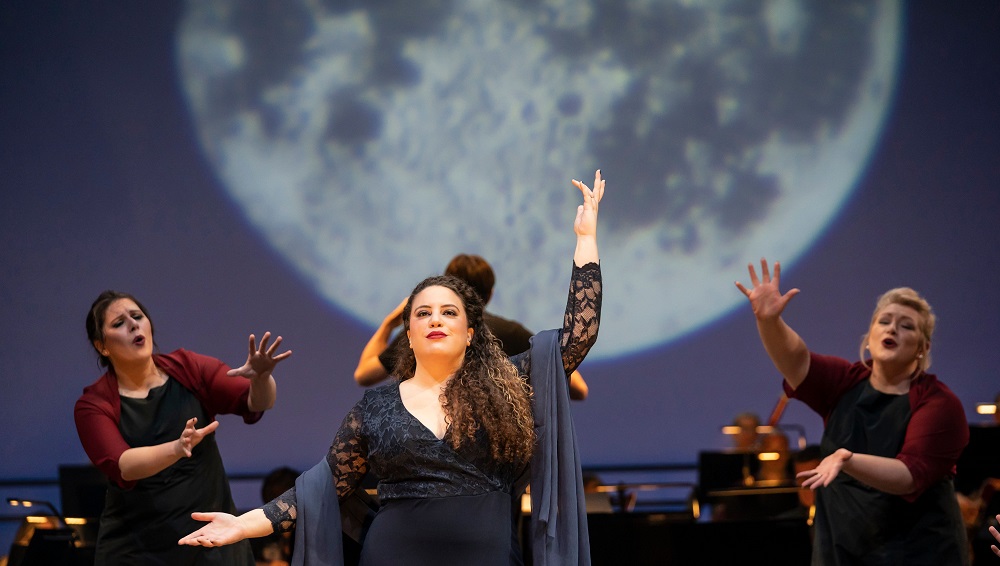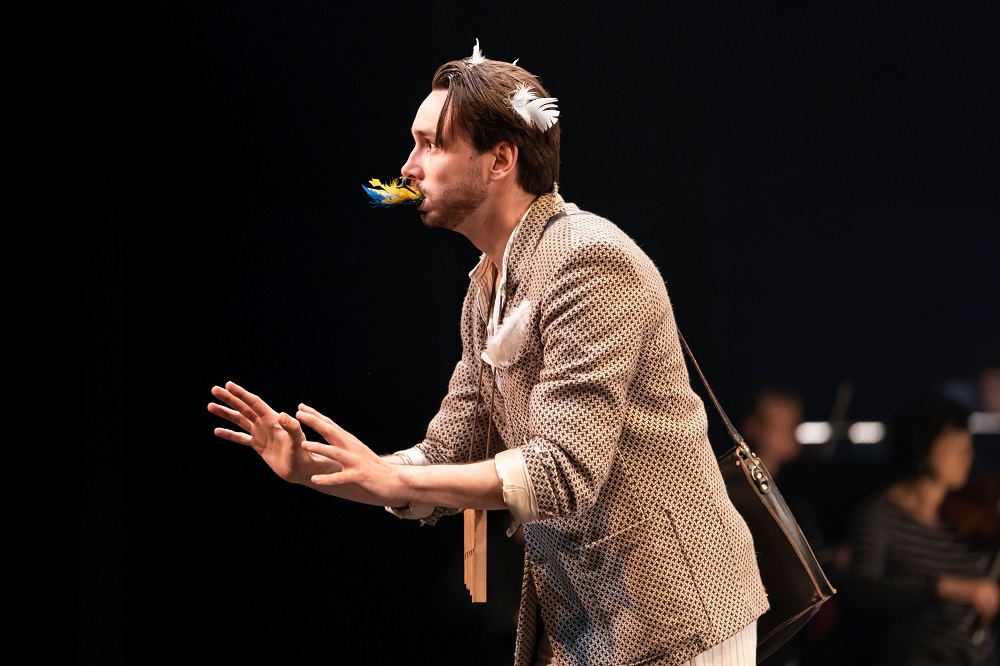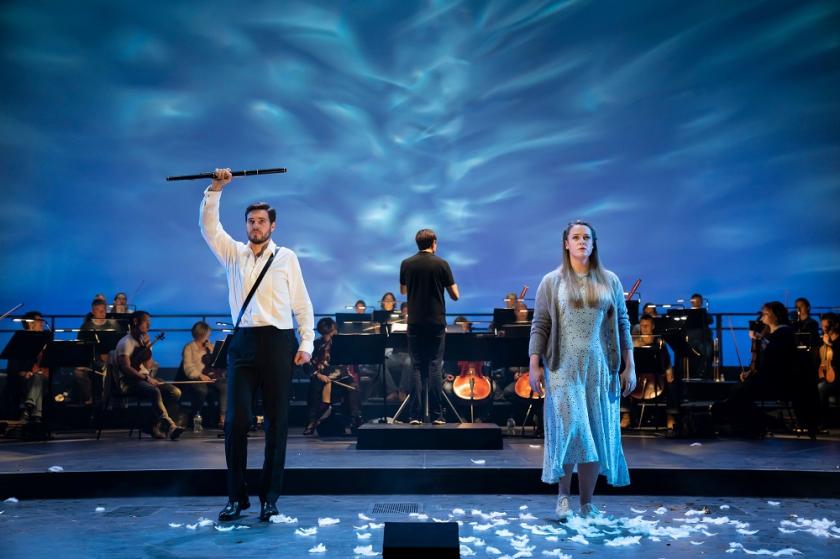How does Mozart do it? His music can provoke deep emotions even in the unlikeliest operatic situations, if well done, and present circumstances stirred them up all the more on Sunday afternoon. Those flirtatious ladies flouncing around the prone prince in the first musical number of The Magic Flute – no overture here – only had to sing “although it breaks my heart in two/I have to bid farewell to you/until we meet again" for another tearful turn of the screw. There was more dramatically justified cause for the floodgates to open as heroine Pamina arrives to lead her Tamino through the climactic trials of fire and water, and together with the two armed men at the gateway, they sing “we need its [the flute's] magic power and might/to lead us through death's darkest night".
The youth of most of these first-rate singers heightened feelings of happiness, regret and a gratitude that Glyndebourne was offering the real Mozartian thing – full Glyndebourne Tour Orchestra conducted by Leo McFall included. Had you been following their careers, it was all the more remarkable to see how far they’d come. None more so than Nazan Fikret, unforgettable as a petulant-scary child in Britten’s The Turn of the Screw, graduating to a rather touching Governess in a North Norfolk production directed by a friend of mine, and now a Queen of the Night who would grace any stage in the world (pictured below with two of her ladies, Carrie-Ann Williams and Eirlys Myfanwy Davies). Indeed, I’ve never heard a better for the combination of steely regality and not only all the ear-popping top notes but all the ornamentations accurately done as well.  Former Royal Opera Jette Parker Young Artist Thomas Atkins, who sang Idomeneo's "Fuor del mar" in the 2017 Europe Day Concert at St John’s Smith Square, has graduated to a regal prince all too likely to respond to the lofty theatrics of the star-blazing queen. From the start he suggests lyric-heroic tenor in the brightest terms, though he can be softly caressing, too, as he was at a surprising late stage in the aria where Tamino contemplates a (here living) portrait of Pamina. Gemma Summerfield, an obvious star in the making for Ian Page’s Classical Opera, brings the full radiance of youthful soprano to Pamina; the closing stages of her lament were magically hushed, too, and the moments where time stands still – in Act One when she tells Papageno to “be truthful”, in Act Two where she greets her prince before the trials, and meets a similar response of heartbreaking tenderness, simply perfection.
Former Royal Opera Jette Parker Young Artist Thomas Atkins, who sang Idomeneo's "Fuor del mar" in the 2017 Europe Day Concert at St John’s Smith Square, has graduated to a regal prince all too likely to respond to the lofty theatrics of the star-blazing queen. From the start he suggests lyric-heroic tenor in the brightest terms, though he can be softly caressing, too, as he was at a surprising late stage in the aria where Tamino contemplates a (here living) portrait of Pamina. Gemma Summerfield, an obvious star in the making for Ian Page’s Classical Opera, brings the full radiance of youthful soprano to Pamina; the closing stages of her lament were magically hushed, too, and the moments where time stands still – in Act One when she tells Papageno to “be truthful”, in Act Two where she greets her prince before the trials, and meets a similar response of heartbreaking tenderness, simply perfection.
Baritone Huw Montague Rendall (pictured below) many of us already know as a stage natural, and his Papageno had charm as well as a never overdone comedy, all the better perhaps for the spoken dialogue being trimmed to a minimum (though Jeremy Sams's translation is witty with it). It's no surprise to learn that he'll be singing Guglielmo in Così fan tutte next Glyndebourne season (inshallah). Greater authority and vocal security were needed only from David Shipley’s Sarastro; that should come in time. The other roles were all taken at the highest level, and namechecks are due for Williams, Kamilla Dunstan and Davies as three very lustrous three ladies, David Shaw as lustful Monostatos, clarion tenor Brenden Gunnell and true young bass William Thomas as the two priests/armed men, late step-in Madison Nonoa-Horsefield as a Papagena filling her brief time on stage with personality.  Inevitably there were musical casualties in a show which could probably have stretched to two unintervalled hours like Garsington's musically complete Fidelio – the biggest being the platonic duet about love between Papageno and Pamina as well as the playful-sublime music for the Three Boys – but we did get a 14-strong chorus, bolstered by some of the smaller-part principals in a resonating chorus to Isis and Osiris and by the rest of the cast in the sun-drenched finale. Donna Stirrup's staging hit the minimal mark early on with feathers and picture frame, but had no more success with Sarastro’s brotherhood than most, suggesting him as a suited demagogue with American tinsel pom-poms to support his campaign. Still, the projected moon, sun, water and fire were all we needed for the cosmic dimensions.
Inevitably there were musical casualties in a show which could probably have stretched to two unintervalled hours like Garsington's musically complete Fidelio – the biggest being the platonic duet about love between Papageno and Pamina as well as the playful-sublime music for the Three Boys – but we did get a 14-strong chorus, bolstered by some of the smaller-part principals in a resonating chorus to Isis and Osiris and by the rest of the cast in the sun-drenched finale. Donna Stirrup's staging hit the minimal mark early on with feathers and picture frame, but had no more success with Sarastro’s brotherhood than most, suggesting him as a suited demagogue with American tinsel pom-poms to support his campaign. Still, the projected moon, sun, water and fire were all we needed for the cosmic dimensions.
The orchestra kept it sweet and light for McFall; one early entry and two brief out-of-syncs apart, the singers were with the players behind them throughout. And we were with them throughout – I’m sure they felt that. And they will feel it once more on Tuesday before the house goes dark again for what should have been eight more performances throughout November (we've been here before - English National Opera's new Marriage of Figaro managed one night only in March). All circumstantial precautions were admirably handled, proving that the show could go on had the government not khyboshed the possibility (and in any case jaunts beyond your home territory will be forbidden). If Glyndebourne can find a way to film it, I’d happily watch again – not always the case in an ocean of livestreams when so many of us are still hungry for the real "magic triangle" - as Britten put it, and I'm always keen to repeat it - of composer, performers and audience so palpable yesterday.
- One more performance at Glyndebourne on Tuesday before the house closes due to new Covid-19 restrictions
- Read more opera reviews on theartsdesk














Add comment